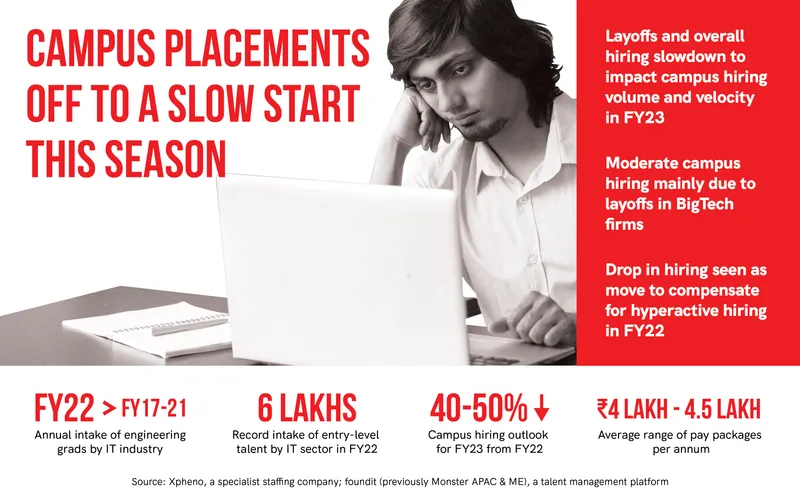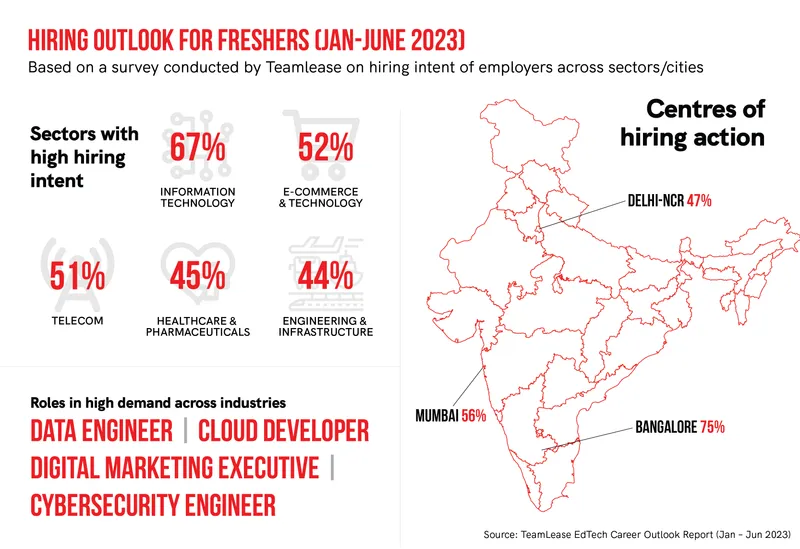Engineering campus placements off to a subdued start amid layoffs and recession fear
After frenzied hiring last year, campus placements have been muted at several engineering colleges across the country. The silver lining is the IT industry is sustaining recruitment on campus and is expected to lead the way going forward as well.
Sohilkumar Sharma (name changed), a final-year mechanical engineering student at K J Somaiya College of Engineering in Mumbai, has received a job offer from IT major Tata Consultancy Services at the ongoing campus placements.
Campus placements mark the culmination of a hectic four-year journey for engineering graduates. And Sharma is among the fortunate graduating students to have found immediate placement. Given the current job scenario, he is happy he has an offer on hand and isn’t too bothered that it isn’t in his chosen field of study.
In fact, Sharma had smartly prepped for IT jobs with the help of his friends in the IT stream when he realised that there weren’t going to be too many mechanical engineering jobs in the offing.
For the lakhs of engineers graduating this year (about 15 lakh engineers are estimated to graduate every year in India), the ongoing campus placement season seems to be a period of challenges and uncertainties due to layoffs in the tech sector and the overall global economic scenario.

Slowdown in campus hiring
Generally, campus placements in the final semester take place between January and May, and hiring in the current season, so far, has been subdued at numerous engineering colleges in the country compared to the last season. Barring the premier institutes, such as the IITs and the NITs, fewer companies are visiting campuses and there are fewer jobs on offer too.
According to Sekhar Garisa, CEO of , a job search platform, campus placement has weakened primarily due to the massive layoffs in the BigTech firms (Amazon announced a reduction of its global headcount by 18,000, while cuts at Meta, and are 11,000, 12,000, and 10,000 respectively).
“The current scenario of enterprise layoffs and hiring slowdown will have its impact on hiring volume this campus season,” says Prasadh M S, Head of Workforce Research and Analytics at Xpheno, a specialist staffing company. Rahul S, a hiring manager at a Bengaluru-based firm, too concurs with this view.
However, the drop in hiring could be to compensate for the hyperactive hiring last year. “It is important to note that the reduction is only on a comparative scale to a highly buoyant FY2022 campus season,” says Prasadh.
Employers increased their hiring across industries in 2021, and this trend persisted till the first half of 2022. After that, there has been a dip in the employment market, with companies not just slowing down recruiting but also laying off workers.
According to Prasadh, FY2022 saw a record intake of 6 lakh entry-level engineering talent by the IT industry—this was more than the collective annual intake from FY2017 to FY2021. A similar volume is not on the cards for the current and the next financial year, he cautions. He predicts hiring for FY2023 will be down by at least 40% to 50%.
According to Xpheno estimates, hiring this year could go back to the volume of FY20. Campus hiring numbers (freshers) in the IT sector were 1.05 lakh in FY19, 2.08 lakh in FY20, 90,000 in FY21, and 6 lakh in FY22. Campus hiring in FY23 is expected to be around 2.3 lakh.
For now, campuses have to brace themselves for lower campus visits by enterprises. This could place a strain on placement cells, which not only have to ensure all students are placed but also have to tackle the demand for high-paying jobs from students.
To navigate this scenario, K J Somaiya College of Engineering, Mumbai is allowing students to apply for two job placements, unlike earlier when students were permitted to sit for only one job placement. Students will thus benefit from additional employment options, especially if a particular employer decides to modify or revoke the offer, points out Sandeep Parmar, who is in charge of industry-academic interface at the college.

Employers change tack
The good news is employers are not exactly shunning campuses despite the macroeconomic slowdown. What has changed is their manner of approach. Manic hiring has given way to a steady horses-for-courses strategy, keeping in mind the organisation’s skill requirements and budgets.
Some firms are opting for a leaner bench, while others want to offload expensive resources and replace them with less expensive ones and retrain them. Some companies have delayed bulk hiring, while others are looking to hire fresh talent to create their own talent supply chain, says Shantanu Rooj, Founder and CEO of EdTech.
Employers have realised that hiring lateral talent at a premium is not helping them achieve the intended ROI. “They would be better off engaging with universities early on (at the beginning of the campus season) and creating their own sustainable talent pool,” explains Rooj.
Some companies are also hiring candidates off campus—from Tier I, II or III cities—to reach a wider set of talent and scout for top-quality candidates. Garisa of foundit says this will help them save time and resources otherwise spent on visiting different colleges.
According to Rahul, any graduate who meets the qualifying criteria can participate in these off-campus placements. As a result, there is healthy competition. In the current environment, when there is a skills shortage for certain profiles, such as cybersecurity engineer, data analyst, and cloud engineer, this is a great way to pick the finest talent, he says.
Pay packages to maintain status quo
Remuneration packages in the IT industry moved up to Rs 4 lakh to Rs 4.5 lakh per annum in FY2022, from the Rs 3.5-lakh range earlier. Remuneration is likely to remain at this level this year.
Fresher packages underwent a few rounds of correction in 2021-2022, after remaining stagnant at the sub-$5000 bandwidth for a decade, according to Prasadh of Xpheno.
“With IT bellwethers having done their corrections recently, a movement upward of the average package value is not expected this season,” he notes, although there could be outliers with higher pay packages.
The macroeconomic climate could provide a sufficient backdrop for enterprises to pitch their offers low this season.
Recently, IT services firm Wipro had revised its salary package to freshers from Rs 6.5 lakh offered earlier to Rs 3.5 lakh. Wipro wrote to candidates (recent graduates) enquiring about their willingness to accept the amended wage package offer, according to a report by Moneycontrol.
Nevertheless, some older engineering colleges have managed to buck the trend with a higher average compensation package in the ongoing campus placement season.
For instance, at K J Somaiya (Vidyavihar), Mumbai, the average annual remuneration package jumped significantly to Rs 10 lakh from Rs 6.52 lakh in the previous season. At KIIT Schools of Technology, Bhubaneswar, the average compensation package has exceeded Rs 8.5 lakh this year, up from Rs 6.05 lakh last year.
Amrita Singh (name changed), a final-year student at K J Somaiya, has bagged a job offer from an IT firm. While she is content with it, she does have the option of applying for another placement, which could fetch her a higher pay.
Startups to lay low
Funded tech startups may tap out of the current campus season, according to Prasadh, as VC and PE advisories push for austerity measures amid the funding winter.
Startups are reeling under the pressures of financial loss and layoffs and are slowing down expansion plans in a bid to burn as little cash as possible. As campus hiring is a high-cost undertaking, it could take a hit this year.
“The startup cohort needs a buoyant climate to venture into campus action. However, they (startups) will continue to hunt for some of the cream of talent from pedigree institutes, and the volume of such intake would be minimal,” observes Prasadh.
Startups in the tech space could look at hiring candidates from all engineering streams for specialised roles in emerging technologies such as blockchain, IoT, AI/ML, robotics, advanced automation, crypto, big data and analytics, says Garisa of foundit.

Hiring intent: IT shows the way
When it comes to campus recruitment, it is clear that the IT industry is sustaining the momentum. And it is expected to lead the way going forward as well.
Top Indian IT companies would cumulatively hire 1.55 lakh freshers in the next financial year, according to TeamLease’s Edtech Career Outlook Report (Jan-June 2023). The report also notes that the engineering industry in the country is looking to scale up production operations, thus generating more than 25,000 jobs for freshers.
“The IT services sector will not and cannot stay away from campus for too long,” says Prasadh of Xpheno.
He elaborates, “Loading talent at the bottom of the pyramid is key for enterprises to drive cost-controlled efficiencies. The search for trainable low-cost talent to deal with future growth and expansion will keep the campus hiring funnel warm, if not hot, this season.”
While campus hiring is moderate now, it could pick up towards the end of the year.
IT bellwethers have already announced their hiring projections this year. India’s biggest software exporter recently said it would hire more than 1.25 lakh people in FY24. TCS’ HR chief, Milind Lakkad, stated that the IT company has recruited 42,000 freshers so far in FY23. He also said the firm would hire about 40,000 freshers in FY24.
TCS hired 40,000 freshers on campus in FY21. The number increased to 1 lakh in FY22.
employed 21,000 campus freshers in FY21 and 85,000 in FY22; it anticipates employing 50,000 freshers in FY23.
and are expected to hire more freshers this year.
In FY22, HCL Tech employed 23,000 freshers. In FY23, it is anticipated to hire around 35,000 freshers. In FY22, Wipro employed 19,000 freshers, and could hire roughly 22,000 freshers in FY23.
Even in the face of a muted global sentiment around hiring, several employers in India have expressed their intention to hire freshers. While this is good news for fresh graduates, one must wait and watch to see if the intention translates to actual hiring in the coming months.
(Infographics, illustrations and cover image by Nihar Apte)
Edited by Swetha Kannan







